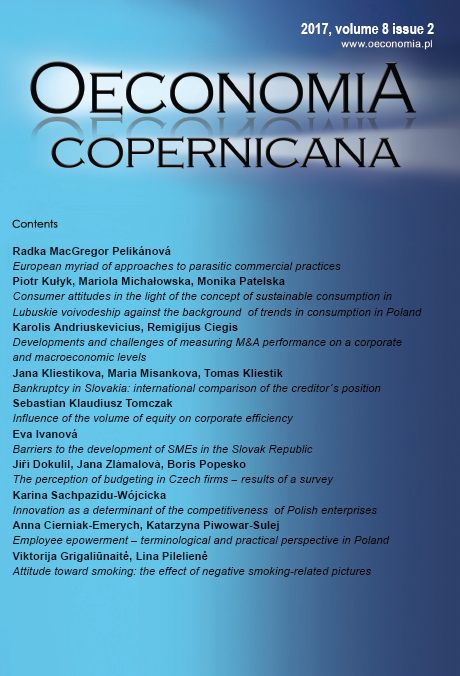ATTITUDE TOWARD SMOKING: THE EFFECT OF NEGATIVE SMOKING-RELATED PICTURES
ATTITUDE TOWARD SMOKING: THE EFFECT OF NEGATIVE SMOKING-RELATED PICTURES
Author(s): Viktorija Grigaliūnaitė, Lina PilelienėSubject(s): Economy, National Economy, Socio-Economic Research
Published by: Instytut Badań Gospodarczych
Keywords: mplicit attitude; explicit attitude; smoking; negative pictures; consumer behaviour
Summary/Abstract: Research background: Endeavouring to develop healthy societies is a primary goal in many countries. As smoking is a major problem of public health, lowering the extent of smoking is one of the conditions for developing a healthy society. Based on the research revealing that the pairing of the product with negative stimuli enhances the possibility of negative reaction to the product as negative stimulus transfers it’s meaning to the product, tobacco packaging was labelled with negative smoking-related pictures illustrating the danger of smoking. Nevertheless, the extent of smoking is still large in many countries. Hence, the effect of negative smoking-related pictures has been the subject of intense debate within the scientific community. Purpose of the article: The aim of this research is to determine the effect of negative smoking-related pictures on the both implicit and explicit attitude toward smoking. Methods: For the purpose of determining the effect of negative smoking-related pictures on the both implicit and explicit attitude toward smoking, Implicit Association Test and questionnaire survey were provided. The questionnaire was elaborated based on the analysis and synthesis of scientific literature. Findings & Value added: The theoretical analysis substantiated the influence of attitude toward the product on consumer purchase decisions. Nevertheless, people do not always want to reveal their opinion, hence traditional marketing research methods for measuring explicit attitude are not sufficient as they are often not objective. Therefore, neuromarketing research methods complement traditional marketing research methods by providing more objectivity. Consequently, the Implicit Association Test and traditional questionnaire research are applied for the empirical research, revealing the effect of negative smoking-related pictures on the both implicit and explicit attitude toward smoking. The recommendations for the usage of negative smoking-related pictures on purpose to influence attitude toward smoking and consumer purchase behaviour are substantiated.
Journal: Oeconomia Copernicana
- Issue Year: 8/2017
- Issue No: 2
- Page Range: 317-328
- Page Count: 12
- Language: English

